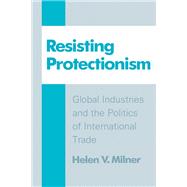Resisting Protectionism
, by Milner, Helen V.- ISBN: 9780691010748 | 0691010749
- Cover: Paperback
- Copyright: 9/1/1989
Why have governments not erected as many trade barriers in the troubled 1970s and 1980s as they did in the 1920s and 1930s? Professor Milner of Columbia argues that the increased internationalization of business has made many firms in many sectors of industry opponents of protectionism, and that this makes a difference to governments. Her evidence is drawn from six U.S. industries in the 1920s, six U.S. firms in the 1970s and six French industries, also in the 1970s. An enormous amount of good work has gone into this valuable study, which is meticulous in its analysis and sensible in its judgments." --Foreign Affairs "A major contribution to the literature exploring the interaction of international and domestic politics. Milner puts the pieces together theory, operationalization, research, argument. A fine book." --Peter Gourevitch, University of California, San Diego In Resisting Protectionism, Helen Milner analyzes the growth of international economic interdependence and its effects on trade policy in the United States and France. She argues that the limited protectionist response of the 1970s stems from the growth of firms' international economic ties, which reduces their interest in protection by increasing its cost. Thus firms with greater international connections will be less protectionist than more domestically oriented firms. The book develops this thesis by examining the international ties of export dependence, multinationality, and global intrafirm trade.






